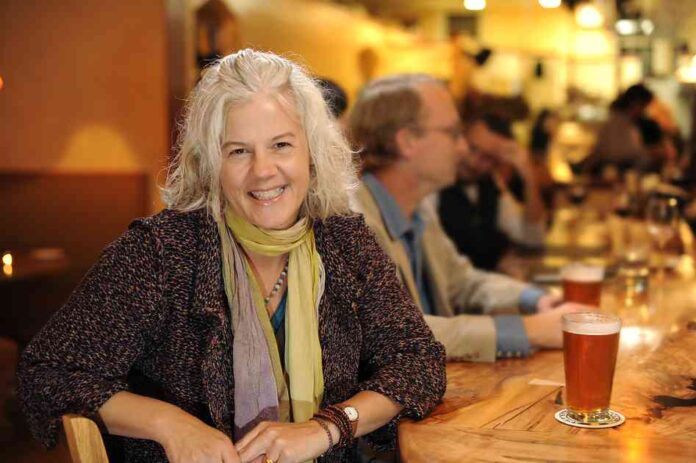
First, a review: If a non-fiction book about the rise and fall – and survival – of the furniture making industry in Southside and Southwestern Virginia can be a page turner, then Factory Man: How One Furniture Maker Battled Off-shoring, Stayed Local and Helped Save an America Town is it. The Little, Brown book is written in a sort of breezy, galloping style that has been compared by some to Laura Hillenbrand’s Unbroken, and aptly so.
Author Beth Macy follows the Bassett Furniture empire as it rose to prominence in the early-mid 1900’s, employing thousands of people in and around Bassett – a true factory town – and in other small town spokes on the Bassett wheel. Over the past 20 years the wheels started to fall off however, as cheap imports from China and other countries made inroads, especially into the bedroom furniture business where Bassett Furniture was king.
Then there is the star of the book, John Bassett III – JB3 as Macy refers to him: shunted aside by a brother-in-law, JB3 headed off for Galax instead, where he built Vaughn-Bassett Furniture into a viable player that still exists today. The twist and turns of the furniture business and how local manufacturers made moves to stay on their feet makes for an interesting read.
Some of the early portions of Factory Man, as readers wade through succession and the family tree can be confusing (there is a grid showing the Bassett family from its beginnings in the business) but once the modern era arrives and the story focuses on John Bassett it’s a worthy and compelling read.
JB3 battled China – even dragging a coalition of American furniture makers to Congressional hearings, successfully seeking duties (tariffs) on those imports after proving that they were being dumped here below cost in many cases to drive American manufacturers out of business. That was ruled a violation of World Trade Organization agreements China had signed on to.
Factory Man is a New York Times non-fiction Top Ten bestseller; actor Tom Hanks gave it “142 stars.” Pulitzer Prize winners have hailed it; Parkway Brewing in Salem even named a new beer in Macy’s honor (Factory Girl). The former Roanoke Times reporter has been making appearances both locally and nationally (she was interviewed on Terry Gross’s NPR program) and Macy will sign copies on Monday, August 18 at Center in the Square, during a 5:30-7:30pm rooftop fundraiser for the Roanoke Community Garden Association.
Macy had originally gone to Southside to do a newspaper story on the decline of the furniture industry there due to globalization – then realized there was more than enough material for a book (she’s already on a deadline for her second book.) She was also told by a friend in the business about John Bassett III.
“I knew immediately it was a bigger story,” said Macy, who saw the Bassett tale as one that could tell the story of what’s happened to American manufacturing through this one family. It took Macy several years to write and research Factory Man – even taking her to Indonesia at one point. Ironically, rising labor costs in China has meant that country has off-shored some of its production to countries like Vietnam and Indonesia.
Bassett did sort of the same thing; drawing the furniture making business south to non-union shops away from places like Grand Rapids, Michigan in the early 1900’s with cheaper labor and a steady supply of timber being the main assets. Macy said she was “totally surprised” by the hugely favorable response to Factory Man, although she knew it was a heck of a story. “I’m really surprised that people find it’s a story they can fall into.”
Macy says trade pacts meant to open international markets to U.S.-made goods have often been one-way streets, with American manufacturers not benefiting. Just take a drive through Bassett and Henry County she says – empty storefronts and shuttered factory buildings are prominent.
“I think what makes John Bassett’s story different is that he looked at what was happening when the Chinese imports came in and he said, ‘guys, they’re not following the rules.’” Then JB3 did something about it. Who knew it would make for a compelling book? Beth Macy figured that out and readers benefit from the local, multi-generational saga.
– Gene Marrano


